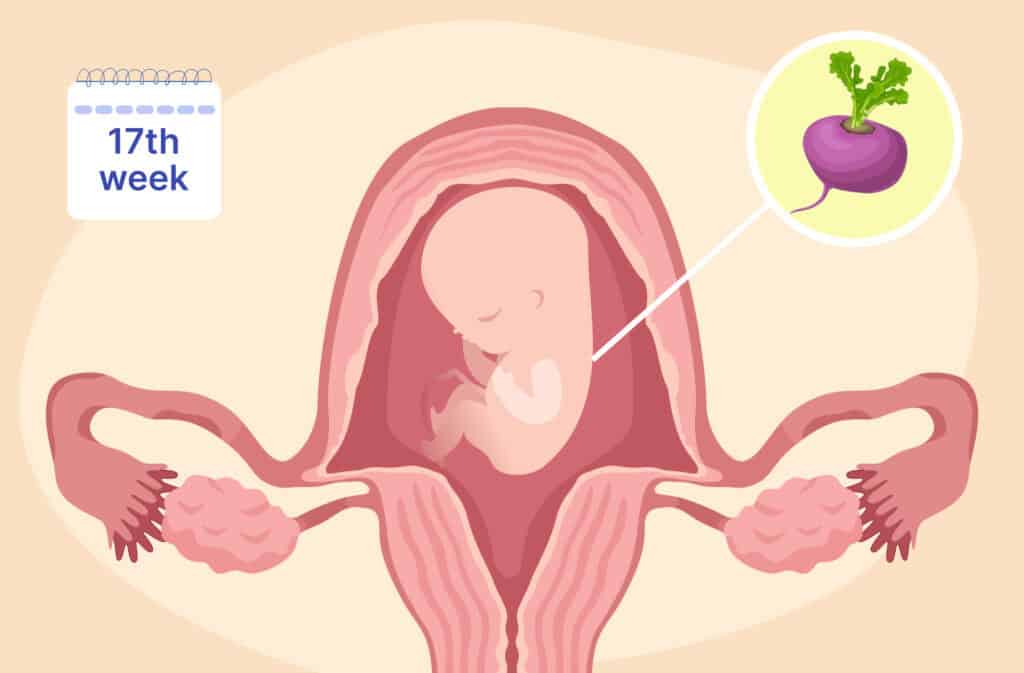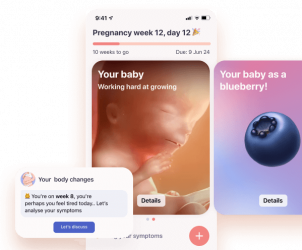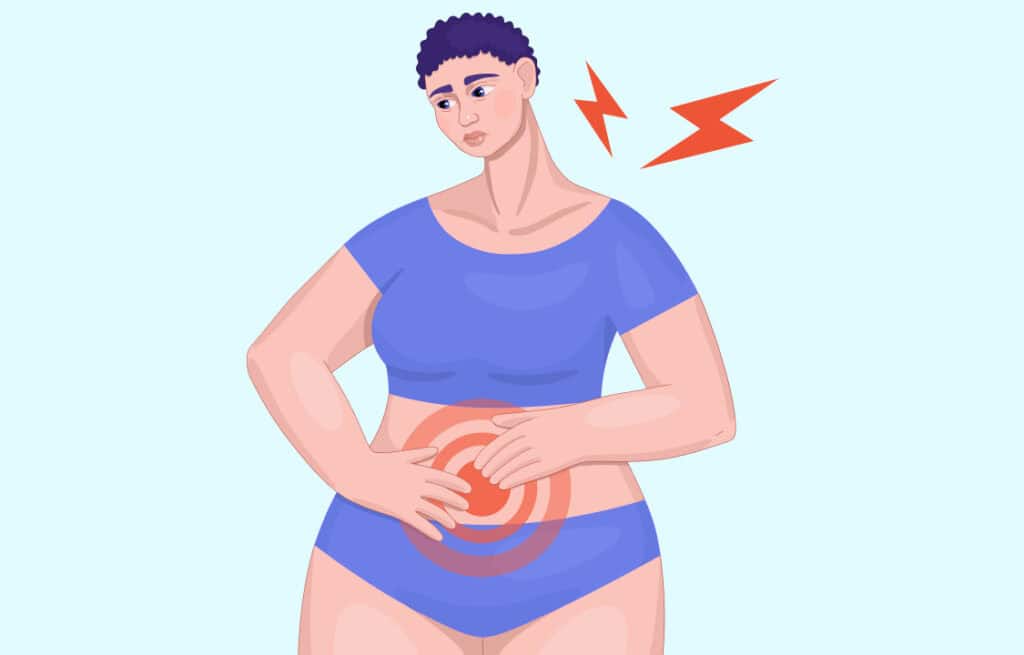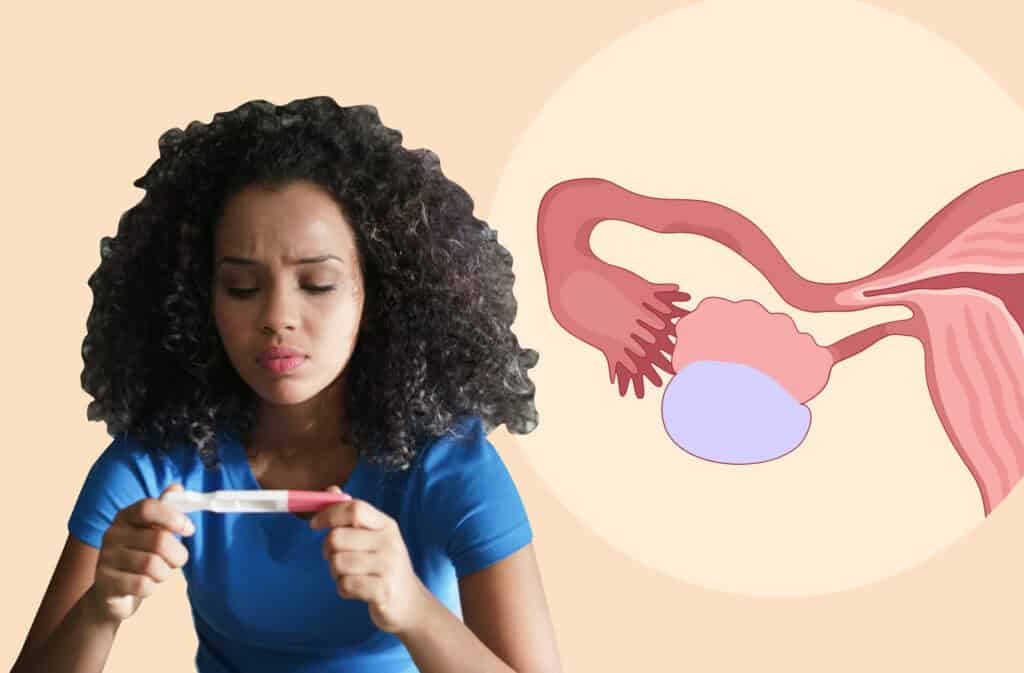Femia > Health Library > Pregnancy > Pregnancy week by week > 17 weeks pregnant: Baby’s growth, position & belly changes
17 weeks pregnant: Baby’s growth, position & belly changes

- Updated Feb 27, 2025
- Published
CRAFTED BY HUMAN
Crafted by human At Femia, we provide accurate and up-to-date information at every stage of your journey, from trying to conceive, pregnancy and postnatal support. All content is created by a real person based on in-depth research and own professional experience. Femia ensures that you will receive expert advice, strict accuracy and a personalized approach from our authors/medical experts. Learn more about our editorial policy.
FACT CHECKED
Fact checked At Femia Health, we maintain the highest standards of editorial excellence in delivering content focused on helping you conceive, guiding you through pregnancy, and supporting you postpartum. Explore our content review principles to learn how we ensure the accuracy and quality of our health and lifestyle tips for every stage of your journey.
At 17 weeks pregnant, your baby’s movements are increasing, and they’re positioned low in the abdomen. The fetus is already the size of a turnip and is practicing movements like sucking and swallowing. You may notice a rounder belly, a boost in energy, and possibly even the first faint kicks.
At 17 weeks pregnant, you’re well into the second trimester, a time when your baby is rapidly growing and developing essential reflexes. Many moms-to-be enjoy a boost in energy this week, with a growing appetite to match. Your uterus is expanding to accommodate your baby, and some women may start feeling light flutters as the baby moves. Here’s everything to expect in week 17, from fetal development to belly changes and self-care advice.

Pregnancy symptoms at 17 weeks
As you progress through the second trimester, you may notice a shift in symptoms as your body adjusts to your growing baby. Common symptoms at 17 weeks include:
Dizziness
Feeling lightheaded or dizzy is a common experience during the second trimester. Pregnancy causes changes in your cardiovascular system, including an increased heart rate and wider blood vessels to support a growing blood volume. To manage dizziness, make sure to stay hydrated, avoid standing up too quickly, and rest when needed.
Vision changes
It’s normal to experience blurry vision or dryness in your eyes during pregnancy, which is caused by hormonal changes, fluid retention, and altered circulation. These effects are typically temporary and will resolve after childbirth. However, if you experience significant vision changes such as double vision or sudden vision loss, contact your healthcare provider.
Itchy skin
Itching is common as your skin stretches to accommodate your growing belly and breasts. Conditions like eczema may also worsen during pregnancy, leading to increased irritation. To relieve discomfort, use fragrance-free moisturizers, apply cold compresses, and take soothing baths. Consult your healthcare provider if itching is severe or accompanied by a rash.
Stretch marks
Stretch marks are a natural part of pregnancy and usually appear on the belly, breasts, and thighs as the skin stretches. While you can’t entirely prevent stretch marks, applying moisturizers and gaining weight gradually may help reduce their appearance. Keep in mind that they tend to fade after delivery.
Weird dreams
Pregnancy hormones and emotional changes often lead to vivid or unusual dreams. From strange to intense, these dreams are common and may reflect subconscious worries or desires. Try keeping a journal of your dreams, which can help you process emotions and serve as a fun memory later on.
Constipation
Hormonal shifts and a growing uterus can cause constipation during pregnancy, making digestion slower. Stay hydrated, consume fiber-rich foods, and exercise regularly to promote healthy digestion. If constipation persists, ask your provider about using a stool softener or adjusting your prenatal vitamin.
👉Find out more: Reaching week 16: Baby’s development, your changing belly, and health tips
Your body at 17 weeks pregnant
At 17 weeks, your uterus is continuing to grow, and it may be positioned just below your belly button, which often creates a more visible bump. Hormonal shifts and increased blood volume can lead to mild congestion and occasional lightheadedness, so remember to stay hydrated and move slowly when standing up.
Your center of gravity is beginning to shift, which can affect balance, so wearing comfortable, supportive shoes is a good idea. As your belly expands, you may also feel mild discomfort in your lower abdomen from round ligament stretching, especially with sudden movements. Using a pregnancy weight gain calculator can help you monitor healthy weight gain.
17-week pregnant belly
By 17 weeks, many women start to show a distinct bump, especially those with a smaller frame or previous pregnancies. The uterus is moving upward in the abdomen, and the bump is becoming more defined, reflecting your baby’s growth. Embrace these changes and consider wearing comfortable, maternity-friendly clothes to support your body as it adapts. Using a pregnancy-tracking app can help you monitor your belly changes and keep you informed about your little one’s development.
Baby development at 17 weeks
At 17 weeks, your baby’s bones are becoming stronger and are now hardening. The baby is also developing more active reflexes, like sucking and swallowing, as they practice movements essential for survival after birth.
- Your baby’s bones. Your baby’s skeleton is transitioning from soft cartilage to solid bone, a process essential for their growth and development. To support this process, ensure you’re consuming enough calcium, which not only benefits your baby’s bone health but also helps reduce the risk of hypertension and preeclampsia during pregnancy.
- The umbilical cord. The umbilical cord is becoming thicker and stronger, growing to around 9 inches in length by the end of pregnancy. This vital cord acts as the link between you and your baby, delivering essential nutrients and removing waste products.
- Your baby’s skin. Sweat glands are beginning to form on your baby’s skin, and in the coming week, the layers of their skin will fully develop. This marks an important milestone as their skin continues to mature, preparing for life outside the womb.
17-week baby size
The 17-week baby size is approximately 5 inches long and weighs about 5 ounces, similar to the size of a turnip. The baby is becoming more active and stronger, practicing essential reflexes and movements that will continue to mature in the coming weeks.
17-week ultrasound
A 17-week ultrasound may reveal remarkable details of your baby’s development. During a 17-week ultrasound 3D scan, you might observe finer features, such as fingers, toes, and even the outline of facial features. If you haven’t yet learned your baby’s gender and wish to, this is around the time when some providers may be able to give you an estimate, although it may not be confirmed until later. An ultrasound is usually done later in the pregnancy, between 18 and 22 weeks, and is called a fetal anatomy scan. During this scan, the doctor examines the baby’s major organs and may also check the baby’s sex.
Where is my baby at 17 weeks in my stomach?
At 17 weeks, your baby is positioned low in your abdomen, near the pelvic area. As the uterus grows and expands, it gradually moves upward, and you may notice your belly becoming rounder and more pronounced.

Tests to expect at 17 weeks of pregnancy
- Urine tests: Routine checks for protein, and infections are common.
- Blood pressure screening: Regular blood pressure monitoring is key to identifying conditions like preexisting hypertension (prior to 20 weeks) and preeclampsia (after 20 weeks). Blood pressure should be checked at every visit.
👉Find out more:
Exploring week 18: What’s happening with baby and your changing body
Week 19 of pregnancy: What’s happening with your baby and bump
Health tips and self-care at 17 weeks pregnant
Focus on nutrition
At 17 weeks, it’s important to nourish your body and support your baby’s growth with a balanced diet. Aim for nutrient-dense foods, such as leafy greens, whole grains, lean proteins, and healthy fats. Make sure you’re getting enough folic acid, iron, and calcium, which are essential for your baby’s development and your overall health during pregnancy.
Stay hydrated
Drinking enough water is crucial during pregnancy, as it helps with digestion, circulation, and maintaining amniotic fluid levels. Try to drink around 8-10 cups of water a day, and more if you’re active or experiencing hot weather. Carry a water bottle with you to remind yourself to drink regularly.
Gentle exercise
Light physical activity, such as walking, swimming, or prenatal yoga, can help boost your energy levels, improve circulation, and reduce stress. Aim for about 30 minutes of moderate exercise most days of the week, but always listen to your body and avoid overexertion. Regular movement also helps alleviate common pregnancy discomforts, like back pain and constipation.
Rest and relaxation
As your pregnancy progresses, prioritizing rest becomes more important. Try to get plenty of sleep and consider taking short naps during the day if you feel fatigued. Practices like deep breathing, meditation, and prenatal massage can also help you relax and reduce stress.
Skin care
With the changes happening in your body, maintaining good skin care practices can help ease discomfort and prevent skin irritation. Use a fragrance-free moisturizer to keep your skin hydrated, especially on areas that may be stretching, such as your belly and breasts. Consider using sunscreen to protect your skin from hyperpigmentation, which can occur during pregnancy.
Questions from the Femia community
Any tips for pregnancy sex?
Communication is key; discuss comfort with your partner and explore different positions. Side-lying or spooning can often be more comfortable as your belly grows. If your placenta has been found on ultrasound to be covering the cervix, sex is typically not allowed so be sure to ask your healthcare provider.
How can I manage nasal congestion at week 17?
Staying hydrated, using a humidifier, and saline nasal sprays can help relieve pregnancy-related nasal congestion.
When should I start thinking about prenatal classes?
Many start around 20 weeks, but researching and registering now can give you a head start on finding classes that fit your schedule.
Is it normal to feel lightheaded?
Yes, hormonal shifts and increased blood volume can cause occasional lightheadedness. Move slowly when standing up, and keep hydrated to help manage this symptom.
What are the chances of a successful pregnancy at 17 weeks?
By 17 weeks, the chances of a successful pregnancy are high, as the risk of miscarriage significantly decreases, and the baby is developing well. However, it's important to continue attending prenatal check-ups for monitoring.
What not to do at 17 weeks pregnant?
At 17 weeks pregnant, avoid heavy lifting, high-risk activities (like certain sports), smoking, alcohol, and consuming unpasteurized foods to protect both your health and your baby's. Always check with your healthcare provider before making any changes to your routine.
The bottom line
At 17 weeks pregnant, your baby is growing rapidly, practicing reflexes, and even beginning to hear faint sounds. Your body is adjusting with a more noticeable bump and some new symptoms, such as mild back pain and nasal congestion. Embrace these changes, stay active with safe exercises, and focus on balanced nutrition and hydration to support you and your baby through this exciting stage of pregnancy.
References
- “17 Weeks Pregnant: Symptoms, Baby Development & Tips.” BabyCenter, www.babycenter.com/pregnancy/week-by-week/17-weeks-pregnant.
- “Week 17 of Pregnancy: Symptoms, Baby Development & More.” What to Expect, www.whattoexpect.com/pregnancy/week-by-week/week-17.aspx.
- “17 Weeks Pregnant: Baby Development, Symptoms & Tips.” NHS, www.nhs.uk/pregnancy/week-by-week/1-to-12/17-weeks/.
- “Pregnancy Week 17: What to Expect.” American Pregnancy Association, www.americanpregnancy.org/healthy-pregnancy/week-by-week/17-weeks-pregnant/.

Does stomach pain after sex mean you are pregnant? Learn if it’s a sign of pregnancy or other health concerns. Understand the causes, symptoms, and when to seek medical advice.

Let’s learn what ovarian cysts are and how they affect fertility. Ovarian cyst types, treatment options, and fertility impact.

Want to achieve a better orgasm? Explore our best techniques and methods to give a try solo and with your partner.

